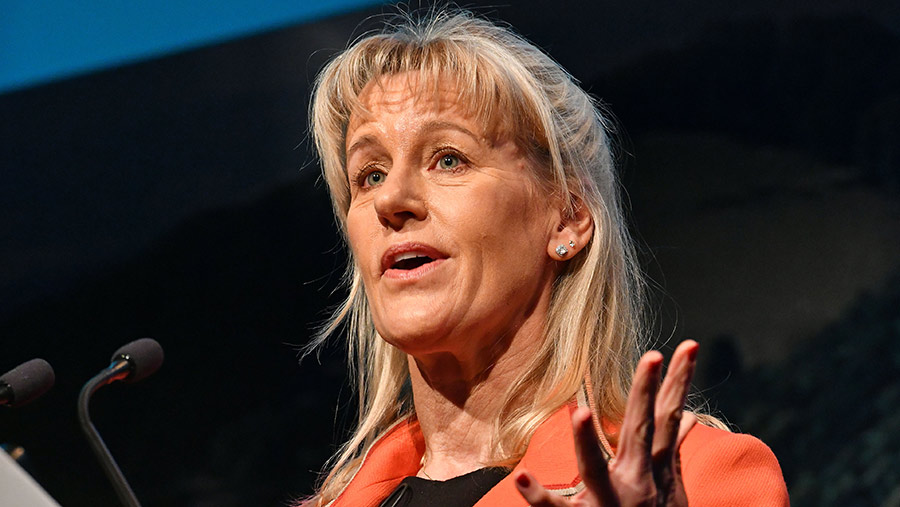Batters fears Sustainable Farming Incentive rates will be ‘underfunded’
 © NFU
© NFU Farm leader Minette Batters fears the government’s upcoming Sustainable Farming Incentive (SFI) – the “bedrock” of Defra’s new post-Brexit agri-environment in England – will be underfunded.
Addressing delegates at the annual NFU conference on Tuesday (22 February), Mrs Batters said farming organisations, including the NFU, drew up a plan to develop Our Vision for a Sustainable Food and Farming Scheme (SFFS) in the summer of 2020.
The study suggested that Defra’s SFI scheme could “bridge the gap” between Environmental Land Management (ELM) and the loss of income from the Basic Payment Scheme (BPS) as direct payments for farmers are phased out.
See also: SFI grossly inadequate for upland farms, union says
Within the plan, farming organisations agreed that 65% of government funding available under the forthcoming ELM programme should be devoted to the SFI.
But Mrs Batters told delegates she was “incredulous to hear the secretary of state [George Eustice] suggest recently that only one-third of the ELM budget will go to the SFI – a scheme he intends to be taken up across 70% of farms”.
Following the results of the pilot SFI scheme, Defra will launch the first four standards of SFI this summer with a focus on soil health.
The payments on offer for the arable and horticultural soil standards range from £22/ha (introductory) to £40/ha (intermediate). However, this rises to £58/ha for the grassland soils standard.
Mrs Batters said she hoped the focus on improving soil health would be well received by farmers, as it was “long overdue”.
“I hope it rewards farmers and growers for good soil management, because that is the basis of climate-friendly food production,” she said.
Andersons research
But Mrs Batters said she hoped Defra had acted on the work commissioned from farm business consultancy Andersons, “which showed that draft versions of the SFI barely produced a profit for farmers”.
The current SFI payment rates on offer from Defra barely cover the cost of delivering the environmental outcome, the NFU said Andersons’ analysts found.
Meanwhile, the Welsh and Scottish governments have committed to continue with the current levels of BPS until 2024. Mrs Batters said this would lead to a two-tier approach to farm support in the UK.
“How is it right that farmers in England are being treated differently to the rest of the UK?” Mrs Batters asked.
ELM ambition
Defra has an ambition to attract at least 70% of eligible BPS claimants to ELM by the end of the agricultural transition in 2028.
In his speech to the conference, Mr Eustice said he often heard that the initial payments for SFI were small. “Indeed, that is what it is, a first step,” he added.
Mr Eustice said he was coming under pressure to go further, but to do that, this would involve “cutting the BPS payment faster than we already are”.
He added that new standards, including a hedgerow standard and integrated pest management standard, would be added to the SFI scheme in the future to allow farmers to receive bigger payments.
